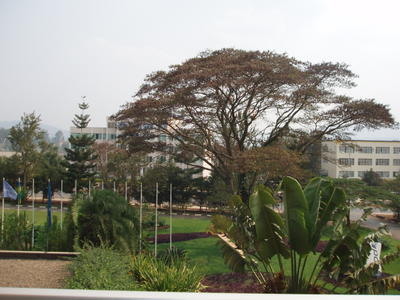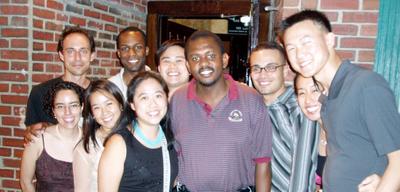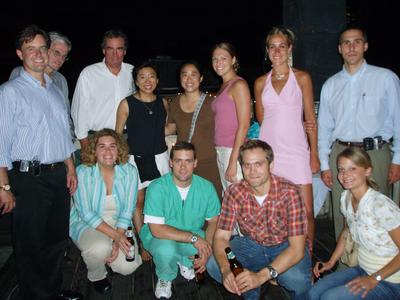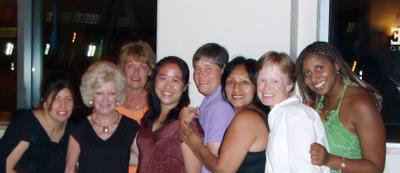More from Gihembe
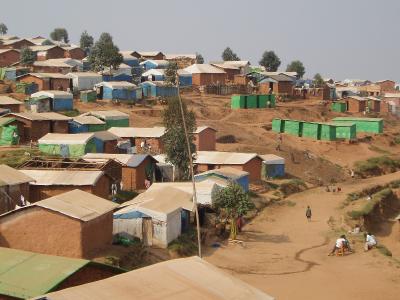
A view of Gihembe camp
Saturday and I have slept almost 12 hours straight. All the rush of packing and moving and traveling has caught up with me. Yesterday was spent getting a feel of the health care activities going on in Gihembe – the nurses see around 100 patients a day in “consultation” asking for help from the physician if any complaints are more complex. There is a small laboratory with ability to do blood counts and HIV testing, a small pharmacy with a fairly good list of medicines on paper although many are out currently and awaiting the next shipment. There are community health workers and traditional birth attendants.
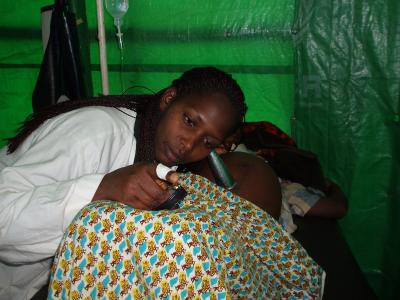
A maternity nurse listening for the fetal heart rate
One woman has been in labor for the past day and the nurse asks me to come take a look at her. I go in and another nurse is listening to the baby’s heartbeat with a silver cone pressed to the mom’s belly. I try her way and don’t hear a thing but with my stethoscope can make out a heart rate of 140. The woman looks exhausted and on exam there has been very little descent of the baby (I of course am feeling woefully inadequate as my OB training was in medical school 7 yrs ago). Looking at the concern on the traditional birth attendant & maternity nurses faces however I realize that this is a formality and what they really need me to do is authorize a transfer. It is humbling but I know I have said the right thing when their faces show relief as I share my thought that I think the mother is too tired and the labor is not progressing appropriately and that we do not have the means to care for her at the camp facilities.
The rest of my day is spent rounding on the patients in the camp infirmary separated into a female, pediatric and mens' ward. There are 8 cots in each ward, and most are full. There are a lot of skin infections, febrile illnesses (all of whom are being treated as malaria) and diarrheal illnesses. There are also 3-4 psychiatric patients who are being given some mixture of phenobarbitol and valium,
Looking out onto the camp, I can’t let myself dwell too long on what a hard life these people have had – sometimes for almost 10 years – because it just makes me too sad. The children who are growing up in this place get to me the most and I try not to think about the learned helplessness being here must foster. The refugees are allowed to leave – it’s not a prison and there are no armed guards- but without proper papers they are exploited – can only take jobs with the most menial of wages and are at risk of detainment any time they are discovered. It’s a brutal existence.
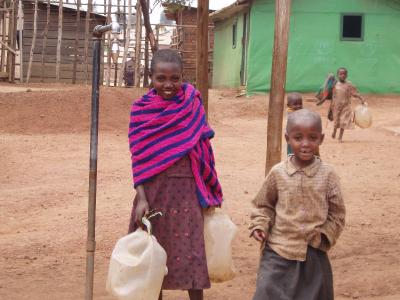
A girl at the water pump
All water must be brought back to their dwellings in large plastic 5 gallon containers (it’s often the little girls I see carrying these). The ration of soap is one bar per person per month to do all personal cleaning as well as washing of clothes. Most of these refugees fled Rwanda or lived on the border areas in the Congo when the genocide took place in 1994 – then they were brutalized by the Interhamwe (the remnant militia that was pushed out of Rwanda into Congo) and are refugees in a sense back in their own country. It isn’t safe for them to repatriate to Congo and the Rwandan government – doesn’t see a financially viable way of settling them in Rwanda. It’s a problem that I can’t think of any solution to... all I know that there are 15,000 lives in front of me that are being kept in a state of limbo…
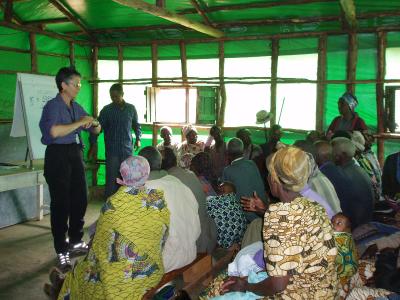
Louise teaching an IGP (Income Generating Project) Seminar
Still there continue to be signs of life – I finally was able to sit in on the Income Generation Project that Louise has been giving seminars on all month. She is a dynamic teacher and the room is full of adults whose hands shoot in the air with every question asked. They are so eager to learn – and it’s very basic business principles that Louise is teaching.. start-up capital, resource management, profit, investment, collaboration – but you can see from how excited and attentive the students are that this is more of what is needed – an option for them to take control of their own existences.
Dr. Moses returned from Kigali last night and was able to come over for a quick meeting. He is Rwandan and has been the Gihembe camp physician for several years now. He’s very sharp and energetic and so clearly cares deeply about what he is doing. Barry has asked me to put together a grant proposal for additional HIV education / treatment funding and Moses and I sketch the outline before he has to leave for another meeting.
I will be traveling to Ngarame tomorrow to see the “new” camp Nyabiheke where I will likely be spending more of my time as the medical care in that facility is in its infancy. Today I have my post-Mefloquine haziness and will be glad to spend time exploring Byumba and resting.
